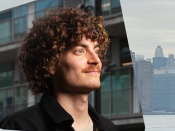Por Diana Tavares (hmR COI (Centre of Intelligence) e Ciências-ULisboa).
Quadrivalent Inactivated Vaccines (QIV) are expected to replace Trivalent Inactivated Vaccines (TIV) over time. In Portugal, TIV is free of charge for risk groups, where the elderly population is included. On its turn, QIV was recently launched in October 2018 and provides wider protection as it includes an additional lineage B strain. The main objective of this project was to adapt the model developed by Universidad Francisco de Vitoria (Madrid) to the Portuguese elderly population to estimate the potential cost-effectiveness of switching from TIV to QIV from the National Health Service (NHS) perspective.
A decision tree model was created and data on Hospitalizations in the 2015/16 season were extracted from the Portuguese Database on Hospital Morbidity. By switching from TIV to QIV, the model estimated that about thirty seven confirmed influenza cases, five hospitalizations and one death could have been averted in the 2015/16 season in the elderly, resulting in a cost-saving of 20 695€. However, the higher cost of QIV would lead to a total increment of 2 848 924€ and the resulting ICER would be 14 242 844€/QALY, largely above the usual cost-effectiveness thresholds. From the NHS, this study concluded that QIV is not cost-effective for the elderly population.
Seminário no contexto do MEIO - Mestrado de Estatística e Investigação Operacional.


















